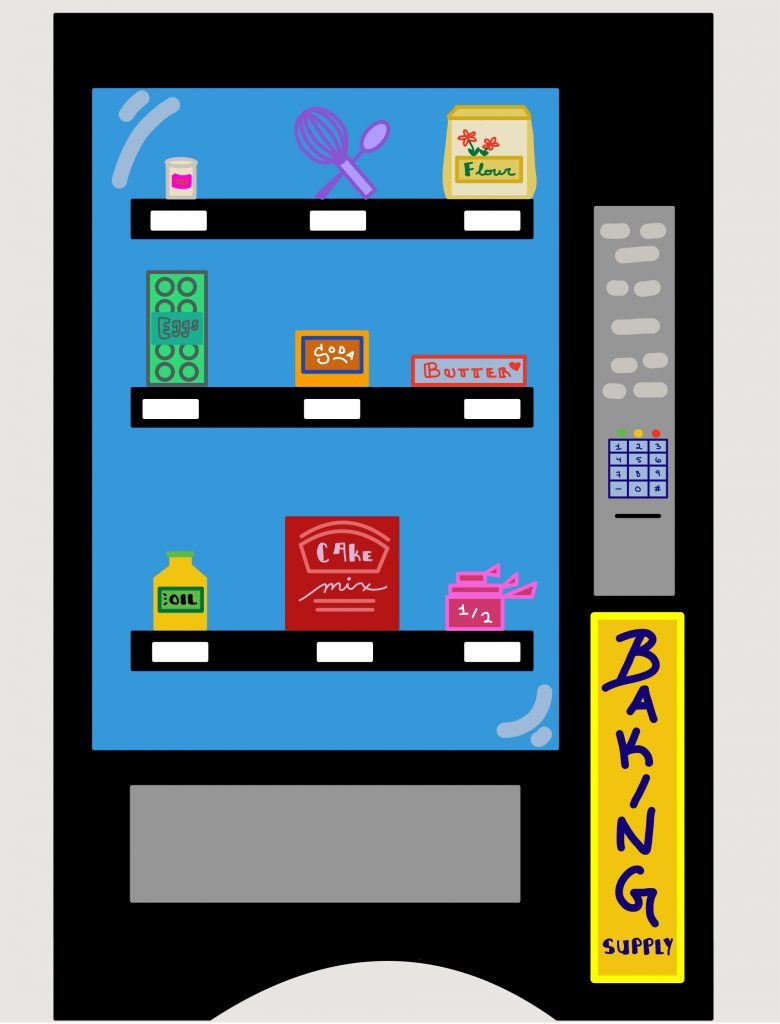
Courtesy of Alison Barlow/Staff Illustrator
Two weeks ago, I spent my Friday afternoon hounding down staff members at the Emporium, DCT, Cox dining hall and Kaldis asking for one common food item: cornstarch for making pastry cream. My wild goose chase turned up nothing.
While I trudged back to my room on the other side of campus, I had an idea. What if vending machines had baking and cooking supplies?
Think about it: what if you’re homesick and want to enjoy food that reminds you of home? I often wish I could eat my mom’s pork rib soup or cook myself a plate of eggs and tomatoes, a classic Chinese dish. The lack of healthy food options, compounded by Emory’s distance from any reputable grocery store, only proves to me that it’s time for the University to invest in both baking supplies and fresh groceries.
Unfortunately, the effort to make one meal in a dorm is grossly inefficient. One grocery trip will inevitably lead to buying far more than you need, resulting not only in potential food waste but also a complete time suck. The same applies to baking; buying a bag of flour and sugar inevitably means you have to continue to bake to use up your supplies. But baking bread or cooking in college require advanced scheduling, accounting for time spent not just to cook or bake, but also buying groceries and waiting on transportation.
In a metropolitan city like Atlanta, owning a car seems almost unnecessary; certainly, the MARTA, Emory shuttles, and other buses across the city would be sufficient for a quick grocery trip to the nearest Kroger or Publix. I was mistaken. Public transportation in Atlanta, as is in the rest of the U.S., continues to be an abysmal disappointment. Obtaining a parking permit at Emory is $336 per semester – and depending on how often you have time to go out, this price tag, in addition to paying for gas and car maintenance, doesn’t seem worth it. Similarly, waiting for an Uber, getting the groceries and then coming back to campus wastes unnecessary time where you could be doing homework or working on a new hobby like playing guitar. People are unable to carve out space in their schedule for a home cooked meal and must settle for the rotating DCT menu that serves nachos and quesadillas for lunch and dinner for nearly a week. As a result, people with cars and a means of transportation become a desperate social commodity that everyone wants to befriend.
But for the rest of us who are too socially anxious to ask our friend’s roommate for a ride or walk up to random people on campus and ask if they have a car, vending machines are the next best way to get what we need.
For most Emory students, their primary source of food is the dining halls or the Emporium, where a box of sushi is nearly $11 and not even payable with meal swipes. Unfortunately, a lot of the meal options at Emory are not healthy, despite the school’s lofty claims otherwise. Adding dieting and nutritional facts does not automatically imply that all the food that is served meets those standards: repeatedly offering bacon and tater tots, both fried foods, as well as pancakes and French toast where people have the option to pile the stacks high with chocolate chips, syrup, marshmallows and other sweets does not benefit students trying to focus on their health. Sometimes people want to eat more than just raw salad vegetables each day, and having the chance to cook those vegetables to personal preference is healthy and rewarding.
Though organizations like Emory Cooking Club and Emory’s chapter of Spoon University can be effective in sharing low-cost, easy-to-make meals for even the most incompetent cooks, it’s useless if no one can obtain the items they need. People will just scroll past the email like they did with President Greg Fenves’ feeble platitude about mental health.
Vending machines, albeit sometimes also pricey, offer innumerable benefits, especially for the high tempo, non-routine college lifestyle: they are efficient, carry a diverse number of products and keep people happy on a whim. But these machines can be filled with more than processed fast food – quite frankly, the fact that we haven’t thought to put other items in them is not only a waste of resources. There are vending machines around campus that have school supplies, so how difficult would it be to tuck fresh groceries and baking supplies into metal spirals in a box?
In fact, fresh food in a vending machine is not a dream or some far-fetched plan. VendLife, a China-based vending machine manufacturer, sells products from traditional drinks and snacks to fresh food and wine. In particular, the fruits and vegetables in the machine are in a temperature-controlled box and catered to a small enough serving size that all the food can be eaten in one meal to prevent food waste. Though VendLife doesn’t have it yet, vending machines could include measuring cups, measuring bowls and whisks for those more inclined toward baking. They can also easily be stocked with non-perishable cooking supplies like cornstarch, a vital ingredient to making pastry cream for cream puffs, or yeast for bread.
Sure, increasing accessibility of these household items isn’t guaranteed to satisfy all your cravings – but at the very least, it eliminates a significant portion of time that you would have had to spend. Instead, with the press of a couple of buttons, you could be well on your way to enjoying a hearty meal reminiscent of home.
Stop thinking about vending machines just as an unhealthy quick fix or a meal replacement when you’re almost late to class. They are the cornerstones of convenience and an inevitable staple in college life when you’re awake at 3:30 in the morning for the fifth time in one week just trying to find some greener and less greasier food.
Sophia Ling (24C) is from Carmel Indiana.
Sophia Ling (she/her) (24C) is from Carmel, Indiana and double majoring in Political Science and Sociology. She wrote for the Current in Carmel. She also loves playing guitar and piano, cooking and swimming. In her free time, she learns new card tricks and practices typing faster.





